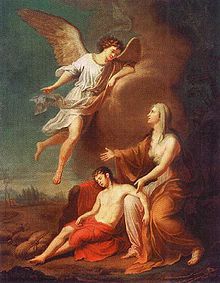
Today’s first reading from Genesis is a little shocking to our 21st Century senses.
Here we have a guy in his 80s who is desperate to produce an heir – a son – to carry on his name (as had been promised by the voice we now recognize as God).
Abram and Sarai were frustrated that they had not been able to conceive a child. So, Sarai comes up with a plan to produce a son through one of her servants, Hagar. She “gives” Hagar to Abram and they get down to business.
Of course, this would not fly today. Such an arrangement would cause quite the scandal. However, we must try to NOT apply our current sense of right vs. wrong when reading these Old Testament stories. Those were different times, servants (slaves) were seen and treated differently and the quest for children, particularly boys, was quite a bit different from today’s contraceptive mentality.
Sarai’s plan worked, sort of, and Abram suddenly had a child named Ishmael. But there was no happy ending for Hagar and her son. Sarai gets jealous and begins to mistreat Hagar, who flees into the desert.
Meanwhile, God finally comes through with a son for Sarai – and after a name change, Sarah and Abraham now have Isaac, who would be the son through which an entire nation of people would emerge – ie, Judaism and eventually, Christianity.
But what of Ishmael?
Banished to the desert, God reaches out to them through an angel and promises that he will protect them so that another nation might emerge through Ishmael – ie, Islam.
This is why we call Abraham the Father of many faiths – at least the three biggies, the monotheistic (one God) faiths that have spread across the globe.
It would be easy to read today’s first reading and come away with the feeling that the present-day divisions between Jews, Christians and Muslims can be traced back to the way Sarah treated Hagar and how Abraham allowed his first son to be banished from the family.
But … I would challenge us to look at it a bit differently.
Yes, there were problems and issues, especially after Hagar and Ishmael rejoined the family for a while. We really don’t know how Ishmael and his little brother Isaac got a long … all we can glean from Scripture is that Sarah continued to feel threatened by the presence of both Ishmael and his mother, Hagar.
Perhaps it was God’s will to allow those feelings to once again split the family and send the oldest boy and his mother back out to the desert. (Or perhaps this part of Genesis was the way the Old Testament storytellers explained why there were divisions among the people who seemed to worship the same God.)
You should continue to read deeper into this story, where you will learn that Abraham stayed in contact with Ishmael and when he finally passed away at the age of 175, both of his boys joined together to bury their father.
While it is apparent that the two quickly split again and both became tools in the hand of God to create many nations … the modern-day concept that there are too many differences among Jews, Christians and Muslims to ever hope for peace has gained worldwide acceptance.
I choose to believe otherwise.
We must never give up on the hope for peace all over the world. As hard as it might be, we must remember that men (and women) do horrible things in the name of what they believe is their religion, or what they feel God would have them do. In other words, they often serve to corrupt the rest of the world’s perception of their faith, based on their acts that may have actually been prompted for other reasons.
Hatred among faiths is often sparked and perpetuated by misunderstandings and the “fake news and views” spread across the land.
Personally, I know many faithful Jews and Muslims who would agree with today’s Psalm …
Give thanks to the LORD, for he is good, for his mercy endures forever.
Who can tell the mighty deeds of the LORD, or proclaim all his praises?
Blessed are they who observe what is right, who do always what is just.
Remember us, O LORD, as you favor your people.
Visit me with your saving help, that I may see the prosperity of your chosen ones,
rejoice in the joy of your people, and glory with your inheritance.
In today’s Gospel, Jesus gives us another morsel of truth to chew on …
Jesus said to his disciples:
“Not everyone who says to me, ‘Lord, Lord,’ will enter the Kingdom of heaven, but only the one who does the will of my Father in heaven.
Many will say to me on that day, ‘Lord, Lord, did we not prophesy in your name? Did we not drive out demons in your name? Did we not do mighty deeds in your name?’ Then I will declare to them solemnly, ‘I never knew you. Depart from me, you evildoers.’
“Everyone who listens to these words of mine and acts on them will be like a wise man who built his house on rock.”
As we move about this crazy and confusing world, my prayer is that we draw closer to God in everything that we do and look at our brothers and sisters – no matter their religion or culture – and recognize them for what they truly are – creations of the same God who created us.
Worthy of our love, our respect and our forgiveness.
